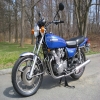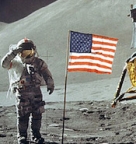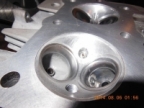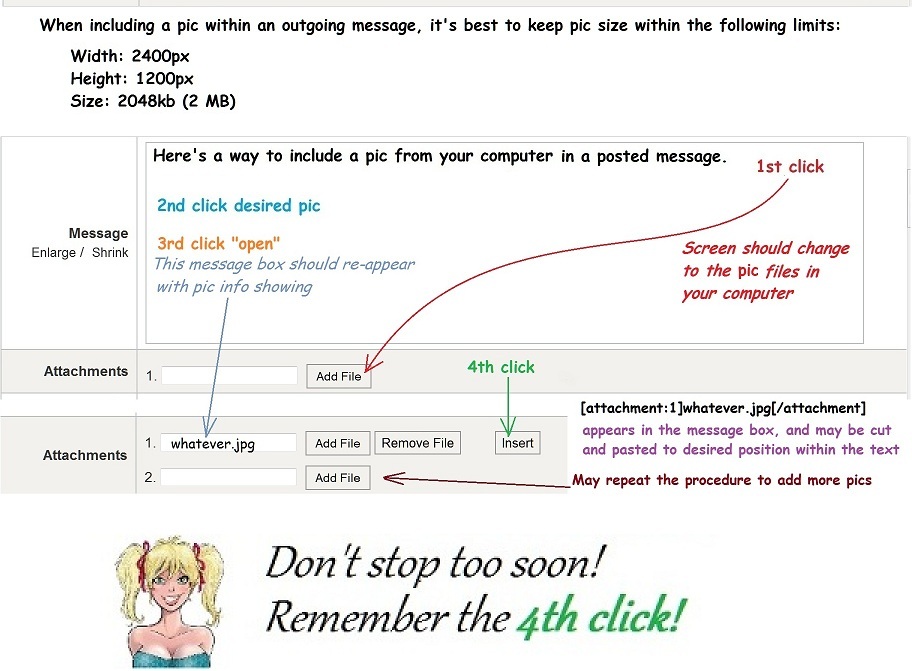New member: KZ750 1984 project
- kawakz750
-
Topic Author
- Offline
- User
-

Registered
- Posts: 4
- Thanks: 0
New member: KZ750 1984 project
18 Sep 2016 09:10
Hi all!
Since 1 day I'm the happy owner of a KZ750 from '84. I'll put up some pictures soon. It's in a really bad shape and the previous owners did a lot of unprofessional repairs on it. But hey, I got it for a cheap price and I'm looking forward to have the project for wintertime! End goal is to drive it from north of Norway to the Netherlands (2400km) in May 2017. I live in north Sweden for the next five months, so I want to make it technically sound in the meantime.
I'm looking for a lot of spareparts, workshop manuals and advice on rebuilding this baby. Does anyone have some recommendations for good reliable websites? Any help there will be much appreciated, I'll toss in a coin where I can as well.
Since 1 day I'm the happy owner of a KZ750 from '84. I'll put up some pictures soon. It's in a really bad shape and the previous owners did a lot of unprofessional repairs on it. But hey, I got it for a cheap price and I'm looking forward to have the project for wintertime! End goal is to drive it from north of Norway to the Netherlands (2400km) in May 2017. I live in north Sweden for the next five months, so I want to make it technically sound in the meantime.
I'm looking for a lot of spareparts, workshop manuals and advice on rebuilding this baby. Does anyone have some recommendations for good reliable websites? Any help there will be much appreciated, I'll toss in a coin where I can as well.
Please Log in or Create an account to join the conversation.
- GPzMOD750
-

- Offline
- User
-

Registered
- Posts: 1365
- Thanks: 148
Re: New member: KZ750 1984 project
18 Sep 2016 09:22
Welcome,
We several active members from Scandinavia, Northern Europe and U.K. that will probably be helpful to you.
Detailed pics and descriptions will most helpful in helping you. Getting the factory manuals are the best place to start there a a few different web sites that have pdf. manuals for the (K)Z750 some better quality than others and you can get decent quality original and reprints on ebay. Going price is $45- $100 US.
We several active members from Scandinavia, Northern Europe and U.K. that will probably be helpful to you.
Detailed pics and descriptions will most helpful in helping you. Getting the factory manuals are the best place to start there a a few different web sites that have pdf. manuals for the (K)Z750 some better quality than others and you can get decent quality original and reprints on ebay. Going price is $45- $100 US.
Please Log in or Create an account to join the conversation.
- 650ed
-

- Offline
- User
-

Registered
- Posts: 15337
- Thanks: 2833
Re: New member: KZ750 1984 project
18 Sep 2016 09:49 - 18 Sep 2016 09:50
Welcome aboard -
Here are some tips that you may find helpful:
Many newbies and not so newbies run into or issues with their bikes which could be easily avoided with a little preparation or information. Here are a couple recommendations that I hope you will find useful.
Before riding your KZ you should take a little time to become familiar with it. Simple things like checking the oil, tire pressures, etc. are explained in the Kawasaki Owner's Manual. If you bike didn't come with one (they normally are in a little holder on the bottom of the seat) you can usually find one on eBay - be sure to get one for your exact year/model.
MANUAL
You really should consider buying the Kawasaki Factory Service Manual for your bike. The factory service manual provides instructions on the various maintenance procedures and schedules for your bike, procedures for diagnosing problems, proper torque values for the various fasteners (VERY IMPORTANT), and insight into how each system on your bike works even if you are not repairing that system. Studying the manual before you attempt performing service on your bike will impart an understanding of the system you are working on which will increase the odds of success.
The manuals usually are readily available for most models on eBay and other sources; but be sure to get one that has your specific year and model in it as there are differences between the various KZ650 models. I do not recommend Clymers, Haynes, or other aftermarket manuals as I have seen instances where they provide inaccurate advice. You may decide to use those to supplement the factory manual, but in my opinion they are not a suitable substitute. If you have trouble finding one for your model ask us to help.
TOOLS
WARNING! Do not even try to use Phillips screwdrivers on the Kawasaki cross head screws. Despite their appearance they are not Phillips screws. They are Japanese Industrial Standard (JIS) screws. The tips of Phillips screwdrivers are too long & pointed to allow the 4 blades of the screwdriver to properly engage the screws, so when you apply force the screw head slots will deform and look like crap. The fact is that Phillips screws were deliberately designed to have the screwdriver bit "cam out." This was done to prevent production line assembly from over-tightening, stripping, or breaking the screws. JIS screws do not have this problem. A proper fitting JIS bit can tighten a JIS screw to and beyond the torque spec without camming out. Here's the good news - you can easily modify standard Phillips screwdriver tips to fit the JIS screws.
I have ground down the tips of DeWalt #2 and DeWalt #3 Phillips to make them fit JIS screws. The large crosshead screws on the cases take modified #3 bits (or genuine #3 JIS bits). To modify the DeWalt bits you need to grind the very tip a little, then test fit, then grind a little more and test fit, etc. until the bit no longer "rocks" back and forth in the screwhead. Picture 1 below shows how a DeWalt #3 bit fits the case screws of my KZ650 after being ground properly. The #2 DeWalt bits can be modified the same way to fit smaller JIS screws. Pictures 2 and 3 below shows DeWalt #2 and #3 modified bits.
I did find a place that sells authentic JIS bits. They don't list the #3 bit, but if you contact them they can provide the #3 JIS bits even though they are not listed on the website. These folks were very easy to work with, and the authentic bits do work great. Here's their site:
www.rjrcooltools.com/shop_item_detail.cfm?subcat_ID=89
Pictures 4 & 5 below show a comparison between my home made modified bits with the authentic JIS bits, and picture 6 shows a comparison between Philips and JIS bit tips.
PICTURE 1

PICTURE 2

PICTURE 3

PICTURE 4

PICTURE 5

PICTURE 6
Before reaching for that wrench or ratchet consider the following. The bolts are steel, but your engine and front forks are aluminum. The bolts are much tougher than the aluminum and if over tightened will strip the aluminum threads. Although these can be repaired, preventing damage by applying proper torque will save you grief, time, and money. Tightening fasteners properly requires torque wrenches. Various vendors, including Snap-on, CDI, Sears, etc., market torque wrenches. The two most popular types are the bar type and micrometer type. Either will work, but the micrometer type is a bit easier to use, especially if you are tightening several fasteners with the same torque - such as cylinder head covers. You will need a torque wrench calibrated in INCH POUNDS for many of the bolts. You will also need a torque wrench calibrated in FOOT POUNDS for the larger bolts. Don't try to use the foot pounds wrench on the smaller bolts as it will not be sensitive enough at low torque settings to provide accurate torque. There are many fasteners that require low torque. These include such things as 6mm oil pan bolts, cylinder head cover bolts, etc. for which the torque in 61-78 inch pounds. These low torque bolts require a wrench that is accurate at low settings and this wrench should be graduated in inch pounds. In addition, there are numerous high torque fasteners such as the front axle nuts (51 - 65 foot pounds) or swing arm pivot shaft nuts (58 - 87 foot pounds). These require a wrench that is accurate at higher settings; this wrench should be graduated in foot pounds. Using the proper torque wrenches to correctly tighten fasteners will help prevent damage and contribute to a safe bike. The Kawasaki Service Manual will list the various torque specs for the bolts. I suggest you get the manual before buying the torque wrenches so you can decide which wrenches best meet the torque specs.
Consider buying a can of Kroil penetrating oil and use it to soak stubborn fasteners for a couple days before trying to loosen them. Remember, the original screws and bolts were installed on your bike when Jimmy Carter was President, so many of them may be hard to remove. Kroil can be bought online, at guns shows, and at some other venues.
MOTOR OIL
The ingredients in oils have changed over the years. For example, today's Castrol GTX (and pretty much all AUTOMOBILE oil) is not the same as it was in the 1980's. Back then it worked great in KZ bikes, but things have changed. Zinc and phosphorus additives (ZDDP), important to protect engine components from metal to metal contact, has been reduced since it’s been found to shorten catalytic converter life. Today’s auto oils contain about ½ the ZDDP they used to and different additives have been developed as substitutes. Unfortunately, some of these newer additives, in particular molybdenum disulfide, don’t get along with the wet clutches in our bikes. Newer oils, especially those labeled “Energy Conserving” (EC), which have a high quantity of friction reducing additives, should be avoided. These oils work fine in automobiles but there are better choices for motorcycles.
KZ bikes need oil which is suitable for wet clutches. That distinction was defined by the Japanese Engine Oil Standards Implementation Panel (JASO), and can be noted by oils that meet the "4T” (4 cycle) specification, MA (wet clutch) classification. These oils, which include various synthetic, semi-synthetic, and non-synthetic oils, are sold as specific motorcycle oils. Another type of oil which works well in our bikes is diesel engine oil. These oils are governed by the API (American Petroleum Institute) CI-4/CJ-4 spec and don’t contain clutch-damaging EC additives. You can even purchase Shell Rotella oil which holds a “JASO-MA” certification assuring it will get along well with your wet clutch. All of these newer oils have a reduced ZDDP level too (about 1/3 less than before instead of ½ like the auto oils) but the substitute additives get along better with our bikes needs than automotive oil. Oils that do not hold the JASO-MA rating have either failed the wet clutch test or have not been tested for use in engines with wet clutches. Good luck with your bike! Ed
Here are some tips that you may find helpful:
Many newbies and not so newbies run into or issues with their bikes which could be easily avoided with a little preparation or information. Here are a couple recommendations that I hope you will find useful.
Before riding your KZ you should take a little time to become familiar with it. Simple things like checking the oil, tire pressures, etc. are explained in the Kawasaki Owner's Manual. If you bike didn't come with one (they normally are in a little holder on the bottom of the seat) you can usually find one on eBay - be sure to get one for your exact year/model.
MANUAL
You really should consider buying the Kawasaki Factory Service Manual for your bike. The factory service manual provides instructions on the various maintenance procedures and schedules for your bike, procedures for diagnosing problems, proper torque values for the various fasteners (VERY IMPORTANT), and insight into how each system on your bike works even if you are not repairing that system. Studying the manual before you attempt performing service on your bike will impart an understanding of the system you are working on which will increase the odds of success.
The manuals usually are readily available for most models on eBay and other sources; but be sure to get one that has your specific year and model in it as there are differences between the various KZ650 models. I do not recommend Clymers, Haynes, or other aftermarket manuals as I have seen instances where they provide inaccurate advice. You may decide to use those to supplement the factory manual, but in my opinion they are not a suitable substitute. If you have trouble finding one for your model ask us to help.
TOOLS
WARNING! Do not even try to use Phillips screwdrivers on the Kawasaki cross head screws. Despite their appearance they are not Phillips screws. They are Japanese Industrial Standard (JIS) screws. The tips of Phillips screwdrivers are too long & pointed to allow the 4 blades of the screwdriver to properly engage the screws, so when you apply force the screw head slots will deform and look like crap. The fact is that Phillips screws were deliberately designed to have the screwdriver bit "cam out." This was done to prevent production line assembly from over-tightening, stripping, or breaking the screws. JIS screws do not have this problem. A proper fitting JIS bit can tighten a JIS screw to and beyond the torque spec without camming out. Here's the good news - you can easily modify standard Phillips screwdriver tips to fit the JIS screws.
I have ground down the tips of DeWalt #2 and DeWalt #3 Phillips to make them fit JIS screws. The large crosshead screws on the cases take modified #3 bits (or genuine #3 JIS bits). To modify the DeWalt bits you need to grind the very tip a little, then test fit, then grind a little more and test fit, etc. until the bit no longer "rocks" back and forth in the screwhead. Picture 1 below shows how a DeWalt #3 bit fits the case screws of my KZ650 after being ground properly. The #2 DeWalt bits can be modified the same way to fit smaller JIS screws. Pictures 2 and 3 below shows DeWalt #2 and #3 modified bits.
I did find a place that sells authentic JIS bits. They don't list the #3 bit, but if you contact them they can provide the #3 JIS bits even though they are not listed on the website. These folks were very easy to work with, and the authentic bits do work great. Here's their site:
www.rjrcooltools.com/shop_item_detail.cfm?subcat_ID=89
Pictures 4 & 5 below show a comparison between my home made modified bits with the authentic JIS bits, and picture 6 shows a comparison between Philips and JIS bit tips.
PICTURE 1

PICTURE 2

PICTURE 3

PICTURE 4

PICTURE 5

PICTURE 6
Attachment JISvs.PhillipsAngles-2-3-4-5-6-7-8-9.jpg not found
Before reaching for that wrench or ratchet consider the following. The bolts are steel, but your engine and front forks are aluminum. The bolts are much tougher than the aluminum and if over tightened will strip the aluminum threads. Although these can be repaired, preventing damage by applying proper torque will save you grief, time, and money. Tightening fasteners properly requires torque wrenches. Various vendors, including Snap-on, CDI, Sears, etc., market torque wrenches. The two most popular types are the bar type and micrometer type. Either will work, but the micrometer type is a bit easier to use, especially if you are tightening several fasteners with the same torque - such as cylinder head covers. You will need a torque wrench calibrated in INCH POUNDS for many of the bolts. You will also need a torque wrench calibrated in FOOT POUNDS for the larger bolts. Don't try to use the foot pounds wrench on the smaller bolts as it will not be sensitive enough at low torque settings to provide accurate torque. There are many fasteners that require low torque. These include such things as 6mm oil pan bolts, cylinder head cover bolts, etc. for which the torque in 61-78 inch pounds. These low torque bolts require a wrench that is accurate at low settings and this wrench should be graduated in inch pounds. In addition, there are numerous high torque fasteners such as the front axle nuts (51 - 65 foot pounds) or swing arm pivot shaft nuts (58 - 87 foot pounds). These require a wrench that is accurate at higher settings; this wrench should be graduated in foot pounds. Using the proper torque wrenches to correctly tighten fasteners will help prevent damage and contribute to a safe bike. The Kawasaki Service Manual will list the various torque specs for the bolts. I suggest you get the manual before buying the torque wrenches so you can decide which wrenches best meet the torque specs.
Consider buying a can of Kroil penetrating oil and use it to soak stubborn fasteners for a couple days before trying to loosen them. Remember, the original screws and bolts were installed on your bike when Jimmy Carter was President, so many of them may be hard to remove. Kroil can be bought online, at guns shows, and at some other venues.
MOTOR OIL
The ingredients in oils have changed over the years. For example, today's Castrol GTX (and pretty much all AUTOMOBILE oil) is not the same as it was in the 1980's. Back then it worked great in KZ bikes, but things have changed. Zinc and phosphorus additives (ZDDP), important to protect engine components from metal to metal contact, has been reduced since it’s been found to shorten catalytic converter life. Today’s auto oils contain about ½ the ZDDP they used to and different additives have been developed as substitutes. Unfortunately, some of these newer additives, in particular molybdenum disulfide, don’t get along with the wet clutches in our bikes. Newer oils, especially those labeled “Energy Conserving” (EC), which have a high quantity of friction reducing additives, should be avoided. These oils work fine in automobiles but there are better choices for motorcycles.
KZ bikes need oil which is suitable for wet clutches. That distinction was defined by the Japanese Engine Oil Standards Implementation Panel (JASO), and can be noted by oils that meet the "4T” (4 cycle) specification, MA (wet clutch) classification. These oils, which include various synthetic, semi-synthetic, and non-synthetic oils, are sold as specific motorcycle oils. Another type of oil which works well in our bikes is diesel engine oil. These oils are governed by the API (American Petroleum Institute) CI-4/CJ-4 spec and don’t contain clutch-damaging EC additives. You can even purchase Shell Rotella oil which holds a “JASO-MA” certification assuring it will get along well with your wet clutch. All of these newer oils have a reduced ZDDP level too (about 1/3 less than before instead of ½ like the auto oils) but the substitute additives get along better with our bikes needs than automotive oil. Oils that do not hold the JASO-MA rating have either failed the wet clutch test or have not been tested for use in engines with wet clutches. Good luck with your bike! Ed
1977 KZ650-C1 Original Owner - Stock (with additional invisible FIAMM horn)
Last edit: 18 Sep 2016 09:50 by 650ed.
Please Log in or Create an account to join the conversation.
- scubaanders
-

- Offline
- Sustaining Member
-

Registered
- Posts: 554
- Thanks: 238
Re: Re:New member: KZ750 1984 project
18 Sep 2016 10:56 - 18 Sep 2016 11:02
Välkommen.
There are a wide number of parts supliers in Sweden and Europe. It all comes down to what part you are looking for and if you want new or second hand parts.
For new stuff www.cmsnl.com in the Netherlands is my first stop.
So send me a pm and I help you sort out where to look.
/Anders
There are a wide number of parts supliers in Sweden and Europe. It all comes down to what part you are looking for and if you want new or second hand parts.
For new stuff www.cmsnl.com in the Netherlands is my first stop.
So send me a pm and I help you sort out where to look.
/Anders
Gpz750R1 1982
Gpz750A1 1983
Gpz1100A2 1984
FZ750 1985
Gpz900R -91
Gpz750A1 1983
Gpz1100A2 1984
FZ750 1985
Gpz900R -91
Last edit: 18 Sep 2016 11:02 by scubaanders.
Please Log in or Create an account to join the conversation.
- kawakz750
-
Topic Author
- Offline
- User
-

Registered
- Posts: 4
- Thanks: 0
Re: New member: KZ750 1984 project
19 Sep 2016 10:41
Thanks guys for the warm welcome! Going to look into all your suggestions! Here is a photo. First going to check the engine for any problems before I put more money in it. Then lights, brakes, suspensions, saddle, speedo and exhaust.
Regarding the workshop manual and parts, I can't seem to find Z750 L4 parts/manuals. I know that L4 corresponds to 1984, L3 to 1983, and so on. But what is exactly the difference between them? Can I use L1/2/3 parts/manuals for my L4?
Regarding the workshop manual and parts, I can't seem to find Z750 L4 parts/manuals. I know that L4 corresponds to 1984, L3 to 1983, and so on. But what is exactly the difference between them? Can I use L1/2/3 parts/manuals for my L4?
Attachment IMG_0739.jpeg not found
Please Log in or Create an account to join the conversation.
- scubaanders
-

- Offline
- Sustaining Member
-

Registered
- Posts: 554
- Thanks: 238
Re: New member: KZ750 1984 project
19 Sep 2016 11:51
Wow! :woohoo: Those tires must really make the bike justice. :blink:
The “Kawasaki KZ750 four” 1980-1985 workshop manual doesn’t explicitly cover the L4, but there were no biggies between the 1984 L3 and the L4. I doubt that you will be able find the difference if there are any. (that is if those part are not already removed from the bike.)
Check your private messages, I can supply you with a digital copy of manual.
//Anders
The “Kawasaki KZ750 four” 1980-1985 workshop manual doesn’t explicitly cover the L4, but there were no biggies between the 1984 L3 and the L4. I doubt that you will be able find the difference if there are any. (that is if those part are not already removed from the bike.)
Check your private messages, I can supply you with a digital copy of manual.
//Anders
Gpz750R1 1982
Gpz750A1 1983
Gpz1100A2 1984
FZ750 1985
Gpz900R -91
Gpz750A1 1983
Gpz1100A2 1984
FZ750 1985
Gpz900R -91
Please Log in or Create an account to join the conversation.
- 650ed
-

- Offline
- User
-

Registered
- Posts: 15337
- Thanks: 2833
Re: New member: KZ750 1984 project
19 Sep 2016 12:01
For a smoother ride and better handling you may want to switch to the tires shown below. :laugh: :laugh: :laugh: Ed
Attachment 00003a-2-3-4-5-6-7-8-9-10-11-12-13-14-15-16-17-18-19-20-21-22-23-24-25-26-27-28-29-30-31-32-33-34-35-36-37-38-39-40-41-42-43-44-45-46-47-48-49-50-51-52-53-54-55-56-57-58-59-60-61-62-63-64-65-66-67-68-69-70-71-72-73-74-75-76-77.jpg not found
1977 KZ650-C1 Original Owner - Stock (with additional invisible FIAMM horn)
Please Log in or Create an account to join the conversation.
- martin_csr
-

- Offline
- User
-

Registered
- Posts: 8016
- Thanks: 1645
Re: New member: KZ750 1984 project
19 Sep 2016 13:06 - 19 Sep 2016 15:11
Manual. 1980-84 KZ750-4, including the L4. 1983-85 ZX750.
750turbo.com --- Index
.
The pdf manual link is near the bottom of the list. good pdf scans.
Wiring diagrams. mbsween. bike-night. KZ750L3 . Scroll down & click "The Bible" link.
the site has wiring diagrams & a 750-4 pdf manual that isn't scanned as good as the one on the Turbo site.
Note: some of the wiring diagrams are mislabeled in the links: the 1981 Ltd is an H2, the 82 is an H3, & the 83 is an H4.
The pdf manual link is near the bottom of the list. good pdf scans.
Wiring diagrams. mbsween. bike-night. KZ750L3 . Scroll down & click "The Bible" link.
the site has wiring diagrams & a 750-4 pdf manual that isn't scanned as good as the one on the Turbo site.
Note: some of the wiring diagrams are mislabeled in the links: the 1981 Ltd is an H2, the 82 is an H3, & the 83 is an H4.
Last edit: 19 Sep 2016 15:11 by martin_csr.
The following user(s) said Thank You: Nessism
Please Log in or Create an account to join the conversation.
- Kray-Z
-

- Offline
- User
-

Registered
- I need more power Scotty....
- Posts: 583
- Thanks: 107
Re: New member: KZ750 1984 project
20 Sep 2016 14:56 - 20 Sep 2016 15:00kawakz750 wrote:
Attachment IMG_0739.jpeg not found
Despite a tire change, I suspect this won't make the best MX bike for the novice off - roader...
Please do this rare (here it is!) sports model some justice and make it right....again.
2-04 R1, 81 CSR1000, 81 LTD1000, 2-83 GPz1100, 3-79CBX, 81 CBX, 3-XS650, 84 Venture, +parts
Quote "speed costs money...how fast do you want to go?" (Which Z movie?)
Universal formula for how many motorcycles one should own = n + 1, where n is how many motorcycles you own right now....
Quote "speed costs money...how fast do you want to go?" (Which Z movie?)
Universal formula for how many motorcycles one should own = n + 1, where n is how many motorcycles you own right now....
Last edit: 20 Sep 2016 15:00 by Kray-Z.
Please Log in or Create an account to join the conversation.
- kawakz750
-
Topic Author
- Offline
- User
-

Registered
- Posts: 4
- Thanks: 0
Re: New member: KZ750 1984 project
21 Sep 2016 02:35
Thanks for the input guys!
Looking for a garage now and then I hope to start asap to restore the bike in its former glory!
Looking for a garage now and then I hope to start asap to restore the bike in its former glory!
Please Log in or Create an account to join the conversation.
Moderators: Street Fighter LTD

